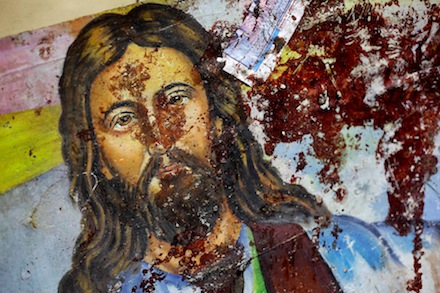[The council] were convinced by Gamaliel, and when they had called in the apostles, they had them flogged. Then they ordered them not to speak in the name of Jesus, and let them go. As they left the council, they rejoiced that they were considered worthy to suffer dishonor for the sake of the name. And every day in the temple and [house to house] they did not cease to teach and proclaim Jesus as the Messiah. (Acts 5:39-42)
It seems to me that this passage is a pretty convincing place to locate the beginning of the “priesthood of all believers.”
Every day …
… in the temple and house to house …
… those who were considered worthy
to suffer for the name …
… did not cease to teach and proclaim.
The apostles were flogged, and they rejoiced.
They were ordered not to speak, and they did not cease to teach and proclaim.
Here’s an example of their proclamation, a song we still sing at Morning Prayer more than 2,000 years later:
A Song to the Lamb Dignus es
Revelation 4:11, 5:9-10, 13
Splendor and honor and kingly power *
are yours by right, O Lord our God,
For you created everything that is, *
and by your will they were created and have their being;
And yours by right, O Lamb that was slain, *
for with your blood you have redeemed for God,
From every family, language, people, and nation, *
a kingdom of priests to serve our God.
And so, to him who sits upon the throne, *
and to Christ the Lamb,
Be worship and praise, dominion and splendor, *
for ever and for evermore.
As we continue reading the next few chapters of Acts, we will see the apostles appointing seven deacons to serve the needs of the Greek-speaking believers as well as the Jewish believers. The song they sing is for “every family, language, people, and nation” — for the whole kingdom of priests.
The deacon Stephen’s preaching — not his table service — gets him stoned to death. He is the next one to be “counted worthy to suffer for the name” (Acts 7:60).
The violence against all of the believers is mounting.
Saul begins to follow the church, persecuting the believers. As they are “every day in the temple and house to house,” so he is “ravaging the church by entering house after house, dragging off both men and women” (Acts 8:3).
But “those who were scattered went from place to place, proclaiming the word” (Acts 8:4). Eventually even Saul is “counted worthy to suffer for the name,” and his conversion leads him to travel widely, entering house after house again, only this time to form churches.
Worthy is the Lamb who was slain, Christ the Lamb.
Worthy are you, when you suffer dishonor for the sake of the name. The church thrived and grew when the going got tough. Even today, “the blood of the martyrs is the seed of the church” (Tertullian).

A blood-spattered poster of Jesus Christ is seen inside the the Coptic Christian Saints Church in the Mediterranean port city of Alexandria (CNS).
Worthy, too, are the priesthood of all believers, those who sing the Lord’s song “every day in the temple and house to house.”
Worthy are you, when you proclaim the good news of Christ not just at church, but also as you go about your daily life.
A Prayer for Mission
Lord Jesus Christ, you stretched out your arms of love on the hard wood of the cross that everyone might come within the reach of your saving embrace: So clothe us in your Spirit that we, reaching forth our hands in love, may bring those who do not know you to the knowledge and love of you; for the honor of your Name. Amen.




